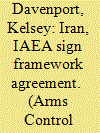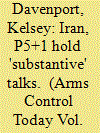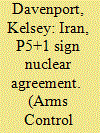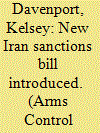| Srl | Item |
| 1 |
ID:
127860


|
|
|
|
|
| Publication |
2013.
|
| Summary/Abstract |
Iran and the International Atomic Energy Agency (IAEA) last month signed a framework agreement outlining future cooperation on the agency's investigations into Tehran's past activities that are suspected of having been part of an effort to develop nuclear weapons. The agreement included six initial actions for Iran to take by mid-February 2014 that will provide the IAEA with access to two nuclear sites and information on Iran's planned nuclear power plants and research reactors. IAEA Director-General Yukiya Amano and Ali Akbar Salehi, head of the Atomic Energy Organization of Iran, signed the agreement in Tehran on Nov. 11. In a statement following the signing, Amano said that "subsequent steps" under the framework would address issues that the six actions do not cover.
|
|
|
|
|
|
|
|
|
|
|
|
|
|
|
|
| 2 |
ID:
128060


|
|
|
|
|
| Publication |
2013.
|
| Summary/Abstract |
Negotiations over Iran's controversial nuclear program were "substantive and forward looking," according to a joint statement released by officials representing Tehran and six world powers after talks Oct. 15-16 in Geneva. Wendy Sherman, U.S. undersecretary of state for political affairs and the leader of the U.S. delegation, said in an Oct. 16 interview with CNN that the parties held a "detailed, substantive discussion with a candor" she had not heard during the past two years of negotiations with Iran. The new negotiating team appointed by recently elected Iranian President Hassan Rouhani met for the first time with representatives from China, France, Germany, Russia, the United Kingdom, and the United States, known collectively as the P5+1, to resume talks on reaching an agreement on Iran's controversial nuclear program. The parties had agreed to resume negotiations after they met in New York on Sept. 26 and Rouhani spoke on the phone with U.S. President Barack Obama on Sept. 27.
|
|
|
|
|
|
|
|
|
|
|
|
|
|
|
|
| 3 |
ID:
127859


|
|
|
|
|
| Publication |
2013.
|
| Summary/Abstract |
Iran and six world powers last month achieved an apparent breakthrough in negotiations over Tehran's controversial nuclear program when the parties reached a first-phase agreement on a six-month deal that will halt Iran's most sensitive nuclear activities and increase international monitoring of its nuclear program in exchange for some relief from sanctions that have hurt Iran's economy.
|
|
|
|
|
|
|
|
|
|
|
|
|
|
|
|
| 4 |
ID:
121718


|
|
|
|
|
| Publication |
2013.
|
| Summary/Abstract |
Iran's newly elected president, Hassan Rouhani, said he hopes for "more active negotiations" with six world powers over Tehran's controversial nuclear program after he takes office on Aug. 3.
|
|
|
|
|
|
|
|
|
|
|
|
|
|
|
|
| 5 |
ID:
127561


|
|
|
| 6 |
ID:
116609


|
|
|
|
|
| Publication |
2012.
|
| Summary/Abstract |
In May 2010, while the United States and other Western powers in the UN Security Council were drafting a resolution on further sanctions to pressure Iran over its controversial nuclear program, Turkey and Brazil-then non-permanent members of the Security Council-announced a fuel-swap deal with Iran. The Tehran Declaration, as it was called, stipulated that 20-percent-enriched nuclear fuel was to be provided to Iran for its use in the Tehran Research Reactor, which produces medical isotopes, in exchange for the removal of 1,200 kilograms of 3.5-percent-low-enriched uranium (LEU) to Turkey.1 Initial reactions to the deal varied, but there was fear that the 20-percent-enriched fuel would enable Iran to further enrich uranium and attain the level necessary to construct a nuclear weapon more rapidly.2
|
|
|
|
|
|
|
|
|
|
|
|
|
|
|
|